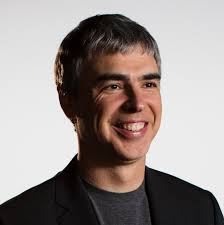Hi, everyone, welcome back. Hope you had a terrific break!
—–
Top News in the A.M.
A quick heads up: the TSA says that it will no longer allow U.S.-bound passengers to board flights at certain overseas airports with uncharged electronic devices.
—–
Missed Connections: Larry Page on Income Inequality
Over the long weekend, Khosla Ventures released a video of its founder, Vinod Khosla, interviewing Google’s founders, Larry Page and Sergey Brin, who rarely participate in joint speaking engagements.
Page and Brin come across as charming in different but complementary ways. Page plays the straight man, responding earnestly to Khosla’s questions about Google’s priorities. “I guess we feel that, right now . . . the actual amount of knowledge you get out of your computer versus the amount of time you spend is still pretty bad. And I think our job is to solve that,” he says.
Meanwhile, Brin is like the smart-alecky brother who cracks wise at Page’s expense. When Khosla asks the founders about machine learning, Brin drapes an arm around Page, saying, “Well, look, this is our latest model right here. See? Not perfect yet but doing pretty well.” The crowd bursts into laughter as Page buries his face in his hands. (We also laughed, watching it online.)
For all the founders’ endearing chemistry, the interview is far from a public relations coup for Google, whose gleaming private buses sparked San Francisco’s so-called “culture wars” last winter. In fact, the video might serve as further evidence that Google’s CEO and co-founder doesn’t think very much of the growing wealth disparity between tech workers and everyone else.
Consider Page’s response when Khosla somewhat timidly asks him about “short-term issues like you see in San Francisco,” such as “people not appreciating that people who are part of the ideas economy … are doing much better than people who aren’t.” Page might have used the question to assert Google’s interest in being a good corporate citizen. Instead, he effectively dismisses the idea that Google has any responsibility for San Francisco’s growing divide between rich and poor.
“This kind of thing is really a governance problem,” says Page, “because we’re building lots of jobs, lots of office buildings, and no housing. So it’s not surprising that [has] caused a lot of issues. You also have a lot of people who are rent controlled, so they don’t participate in the economic increase in housing prices. It actually hurts them. It doesn’t help them. So I think those problems are more structural and very serious problems. We’re not really on a path to fix those problems in this area.”
Page sounds more out of touch when Khosla asks him about the consequences of machines replacing human jobs. “If you really think about the things that you need to make yourself happy – housing, security, opportunities for your kids – anthropologists have been identifying these things — it’s not that hard for us to provide those things,” he tells Khosla. “The amount of resources we need to do that, the amount of work that actually needs to go into that is pretty small. I’m guessing less than 1 percent at the moment.”
Because everyone needs to “feel like you’re needed and wanted and have something productive to do,” one solution might be to “just reduce work time.” Page then adds, “Most people like working, but they’d also like to have more time with their family or to pursue their own interests. So that would be one way to deal with the problem, if you had a coordinated way to just reduce the workweek.”
Simple, right? Not exactly. Page sidesteps the economic consequences of reducing employee hours in an economy in which most people still live paycheck to paycheck. Does he expect companies to pay their employees the same amount of money for less hours? Should the government foot the difference? He doesn’t say.
Judging from the interview, Page wasn’t prepared to talk at length about social issues. After all, this wasn’t a sit-down with the Washington Post. He and Brin were being interviewed by Khosla, a fellow billionaire, at an intimate CEO summit.
But it’s probably time to ditch the platitudes of “Abundance,” a book by serial entrepreneur Peter Diamandis that describes a world in which everyone’s quality of life will continue to rise thanks to the exponential growth of technology. (“I totally believe we should be living in a time of abundance,” Page tells Khosla.)
At the very least, Page might pretend for a moment that he’s not worth $30 billion and consider how his words might sound to those who are working to make ends meet and, in many cases, failing. It’s worth remembering that more than 45 million Americans are right now living in poverty.
We know Brin was just joking when he said his friend Page was a robot. Now it’s time to prove it.
—–
New Fundings
Bonobos, the seven-year-old, New York-based fashion brand that started selling menswear direct-to-consumers online and is now expanding into physical “guide shops” where customers can try on the company’s clothes, has raised $55 million in Series D funding led by Coppel Capital. Bonobos’s earlier investors Accel Partners, Felicis Ventures, Forerunner Ventures, Glynn Capital Management, Lightspeed Venture Partners, Mousse Partners and Nordstrom also participated in the round, which brings the company’s total funding to $127.6 million. PandoDaily has more here.
FXiaoKe, a three-year-old, Beijing, China-based mobile sales management tool, has raised $10 million in Series B funding led by Northern Light Venture Capital, with firms Huaruan Venture Capital, Boya Capital, and IDG Capital participating. FXiaoke previously received “several million dollars” in Series A funding from IDG Capital in July 2012, says China Money Network.
GeneWeave Biosciences, a four-year-old, Los Gatos, Ca.-based diagnostics company that aims to help doctors more quickly identify and fight drug-resistant organisms, has raised $12 million in Series B funding led by earlier investor Decheng Capital. Other previous investors, including Claremont Creek Ventures and X/Seed Capital, also participated in the round, which brings the company’s total funding to $25 million, shows Crunchbase.
Hansoft, a nine-year-old, Uppsala, Sweden-based company that makes project management and and collaboration software, has raised $10 million in Series A funding from Hasso Plattner Ventures and the Nordic venture capital firm Creandum.
HiWiFi, a 16-month-old, Beijing-based maker of “smart” routers, has raised $10 million in Series B funding from Kleiner Perkins Caufield & Byers and the Taiwanese semiconductor maker MTK, according to reports. The company had previously received “tens of millions” of dollars in Series A funding from GGV Capital and Innovation Works, according to China Money Network.
Hungama Digital Media Entertainment, a 15-year-old, Mumbai, India-based aggregator, developer, publisher and distributor of Bollywood and South-Asian entertainment content, has raised $40 million in new funding led by Bessemer Venture Partners, reports VCCircle. Earlier investor Intel Capital, which poured an undisclosed amount of funding into the company in 2012, also participated in this round.
Lmbang, a 1.5-year-old, Shenzhen, China-based online social platform for young mothers to share their experiences, has raised $20 million in Series B funding led by Greenwoods Asset Management. Earlier investors Morningside Ventures, Matrix Partners and K2 Ventures also participated.
Matterport, a three-year-old, Mountain View, Ca.-based company whose 3D reconstruction system allows users to construct 3D models of physical objects and interior spaces, has raised $16 million in new funding led by DCM, which was joined by Jerry Yang’s AME Cloud Ventures. Earlier investors who also participated in the round include AMD Ventures, Felicis Ventures, Greylock Partners, Lux Capital, Navitas Capital, Qualcomm Ventures and Rothenberg Ventures, as well as Crate & Barrel founder Gordon Segal and Sling Media founderBlake Krikorian. The company has now raised $26 million to date, shows Crunchbase. The WSJ has more here.
ParkTag, a 2.5-year-old, Berlin-based mobile app whose community of users help each other to find parking spots, has raised $680,000 from Germany’s High-Tech Gründerfonds, a semi governmental venture fund; the KfW Bank group; and numerous industrial groups, including Deutsche Telekom and Siemens. TechCrunch as more here.
SpaceWays, a new, London-based self-storage business, has raised an undisclosed amount of funding from the German startup backer Rocket Internet, which hired the founders to create the service, reports Reuters. SpaceWays, which launched in London last week, it reportedly “looking to transform the self-storage market into an on-demand business more like package delivery.”
Synchroneuron, a three-year-old, Waltham, Ma.-based biopharmaceutical company that’s developing new therapies to treat tardive dyskinesia and other neuropsychiatric disorders, has raised $20 million in Series B funding from Morningside Technology Ventures. The company has raised $26 million altogether, all from Morningside, shows Crunchbase.
Traity, a two-year-old, Madrid and San Francisco-based online reputation startup, has raised $4.7 million in Series A funding led by Active Venture Partners. Other investors in the round included Horizons Ventures, KRW Schindler Private Ventures, Bertelsmann Digital Media Investments, Lanta Digital Ventures, 500 Startups, Lisa Gansky, Juan Lopez, Matthew Bothner and Dalibor Siroky. TechCrunch has more on the company here.
—–
New Funds
Edison Ventures, a 28-year-old, Lawrenceville, N.J.-based venture firm that focuses on expansion-stage companies in the Eastern U.S., will begin raising its eighth fund later this year, reports VentureWire. Reportedly, the firm will target around $250 million, roughly matching the size of its seventh and six funds. Among Edison’s newest portfolio companies is Trialscope, a Jersey City, N.J.-based company whose software helps clinical trial sponsors comply with legislation and internal policy, as well as to register their clinical trials and disclose their results. The company raised $10 million last month.
Runa Capital, a four-year-old, Moscow-based venture firm, is targeting $200 million to $300 million for a second venture fund that it’s currently raising, reports VentureWire. Serguei Beloussov, the firm’s cofounder and senior partner, says Runa plans to invest the new fund mostly outside of Russia because of Russia’s still small (comparatively) customer base for IT services. Among the firm’s newest portfolio companies: Ecwid, a Moscow-based company that enables merchants to add an online store to their existing website or mobile site.
Santander, one of the largest banks in Europe, is launching a $100 million venture fund to back startups in the financial-technology sector. The London-based fund will operate as a standalone unit and have a global focus.
—–
IPOs
DreamSky Technology, a five-year-old, Shenzhen, China-based third party mobile game publishing platform, has filed to go public on Nasdaq to raise up to $115 million in funding. THL A19 Limited, a company controlled by Tencent Holdings, is the company’s largest shareholder, with a 26.6 percent stake. Dream Data Services, meanwhile, owns 22 percent; Legend Capital owns 20.4 percent; and Redpoint Ventures owns 16.6 percent.
—–
Exits
Expedia just agreed to acquire Australia’s Wotif Group for $658 million. Skift has more here.
Novus Biologicals, an 18-year-old, Littleton, Co.-based supplier of both outsourced and in-house developed antibodies and other reagents for life-science research, has been acquired for $60 million in cash byTechne Corp., a publicly traded company that does business as Bio-Techne. More here.
Wilocity, a seven-year-old, Sunnyvale, Ca.-based company that builds multi-gigabit wireless chipsets, has been acquired by Qualcomm for undisclosed financial terms that some reports peg at $300 million. Wilocity had raised $55 million from investors, including Benchmark, Sequoia Capital, Tallwood Venture Capital, Atheros Communications, Marvell Technology, Jerusalem Global Ventures, and Vintage Investment Partners.
—–
People
Chris Dixon, a general partner at Andreessen Horowitz, tweeted out some funny (and probably fairly true) advice over weekend, writing that “If you are wondering why big tech company bought small tech company, a good default answer is: phones.” He then added, “In fact, you could probably go to a tech cocktail party and answer every question with ‘phones’ and you’d sound pretty smart.”
Jason Goldberg, the CEO of richly funding and flailing Fab, has a new furniture site called Hem that he says it’s going to be fabulous, telling a skeptical reporter: “I’ll tell you what I told our investors: We never signed on to building a two-year business . . .We signed onto build a business over 10, 20 years.”
—–
Job Listings
Syracuse University is in the market for an entrepreneur, business executive or venture capitalist to serve as an assistant professor. (The job is full time, with a renewable annual contract.)
—–
Happenings
Allen & Co.‘s annual Sun Valley conference kicks off on Tuesday.
—–
Essential Reads
How Twitch’s founders turned an aimless reality show Into a video juggernaut.
Wired reports on Google Map hackers, who “can destroy a business at will.”
The Life and Death of “The Internet’s Own Boy.”
—–
Detours
Inside the Viper Room, Hollywood’s most exclusive poker game.
A new report finds that higher intelligence is linked with rural-to-city migration, and with city-to-suburb movement.
James Suroweicki asks: Why are the super-rich so angry?
—–
Retail Therapy
No cloud hanging over your head? You might try this one.
Paddle ball set, now on sale.
—–
To sign up for StrictlyVC, click here. To advertise, click here.
 Last week, we witnessed something fairly remarkable. A major Alphabet executive — Nest Labs CEO Tony Fadell — publicly shamed the cofounder and employees of Dropcam, the connected camera company that Nest had acquired in 2014 for $555 million.
Last week, we witnessed something fairly remarkable. A major Alphabet executive — Nest Labs CEO Tony Fadell — publicly shamed the cofounder and employees of Dropcam, the connected camera company that Nest had acquired in 2014 for $555 million.






